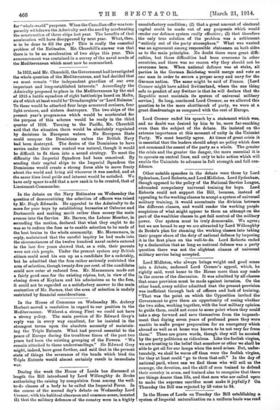During the week the House of Lords has discussed at
length the Bill introduced by Lord Willoughby de Broke authorizing the raising by compulsion from among the well- to-do classes of a body to be called the Imperial Force. In the course of the second day's debate on Wednesday Lord Cromer, with his habitual clearness and common-sense, insisted (1) that the military defences of the country were in a highly
unsatisfactory condition; (2) that a great amount of electoral capital could be made out of any proposals which would render our defence system really effective ; (3) that therefore the only true solution of the problem was a settlement "entirely out of the party atmosphere." What was wanted was an agreement among responsible statesmen on both sides as to the main principles. No doubt there were great diffi- culties, but those difficulties had been overcome in other countries, and there was no reason why they should not be overoome here. When national defence was at stake, all parties in the German Reichstag would merge and rote as one man in order to secure a proper army and navy for the German nation. The same might be said of France. [Lord Cromer might have added Switzerland, where the one thing safe to predict of any Switzer is that he will declare that the Republic must maintain its system of universal military service.] So long, continued Lord Cromer, as we allowed this question to be the mere shuttlecock of party, we were at a great disadvantage as compared with the rest of Europe.










































 Previous page
Previous page